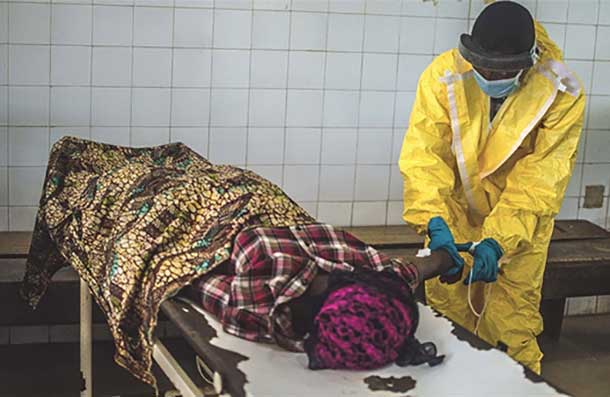
UN Health Official Unveils $100 million Ebola Response Plan
TORONTO – HEALTH – The ambulance carrying Dr. Kent Brantly, one of two Americans infected with the deadly Ebola virus, arrived at Emory University Hospital on Saturday Aerial video shows two people in protective suits getting out of the ambulance.
They can be seen walking slowing into the Atlanta hospital, one of only four institutions in the U.S. equipped to handle such cases.
Brantly was flown in from Liberia in a special medical plane that landed at Dobbins Air Reserve Base in Georgia.
The plane, equipped to handle patients with Ebola, will return to Liberia to pick up Nancy Writebol, the other infected American. Brantly and Writebol were working in Liberia to help combat West Africa’s worst Ebola outbreak on record when they contracted the deadly disease.
West Africa is confronted with a “fast-moving…unprecedented outbreak” of the deadly Ebola disease accompanied by “unprecedented challenges,” but the head of the United Nations health agency today told Presidents of countries affected by the most lethal strain of the virus that “when well-managed, an Ebola outbreak can be stopped.”
Dr. Margaret Chan, Director-General of the UN World Health Organization (WHO) met with the Presidents of Guinea, Liberia, Sierra Leone and Cote D’Ivoire in Conakry, the Guinean capitol, on Friday to launch a new joint $100 million response plan intended to mark “a turning point” of an intensified international, regional and national campaign to bring the outbreak under control.
“The current outbreak is moving faster than our efforts to control it,” Dr. Chan said in remarks delivered to the West African leaders. “If the situation continues to deteriorate, the consequences can be catastrophic in terms of lost lives, but also severe socio-economic disruption and a high risk of spread to other countries.”
“West Africa is facing its first outbreak of Ebola virus disease,” the WHO chief said. “This is an unprecedented outbreak accompanied by unprecedented challenges. And these challenges are extraordinary.”
“West Africa’s outbreak is caused by the most lethal strain in the family of Ebola viruses,” she said. “The outbreak is by far the largest ever in the nearly four-decade history of this disease.”
WHO has said to date, the current outbreak has caused the largest in terms of numbers of cases and deaths, with 1,323 cases and 729 deaths reported to date in West Africa.
The outbreak is also affecting a large number of doctors, nurses, and other health care workers, one of the most essential resources for containing an outbreak. To date, more than 60 health care workers have lost their lives in helping others.
“It is the largest in terms of geographical areas already affected and others at immediate risk of further spread,” Dr. Chan said.
She also announced that on 6-7 August, WHO will convene an Emergency Committee meeting in order to ascertain whether the ongoing Ebola outbreak in West Africa constitutes a “public health emergency of international concern” (PHEIC) and, if it does, to recommend appropriate temporary measures to reduce international spread.
Some international staff are infected. These tragic infections and deaths significantly erode response capacity.
Dr. Chan also said “the situation in West Africa is of international concern and must receive urgent priority for decisive action at national and international levels. Experiences in Africa over nearly four decades tell us clearly that, when well managed, an Ebola outbreak can be stopped.”
WHO has tried to allay fears of contracting the diseases by saying it is not an airborne virus, and transmission requires close contact with the bodily fluids of an infected person, also after death.
“Apart from this specific situation, the general public is not at high risk of infection by the Ebola virus,” Dr. Chan told the West African leaders.
She also said the current outbreak “is not just a medical or public health problem. It is a social problem.”
Deep-seated beliefs and cultural practices are a significant cause of further spread and a significant barrier to rapid and effective containment, according to Dr. Chan.
“Hiding of cases defeats strategies for rapid containment. Moreover, public attitudes can create a security threat to response teams when fear and misunderstanding turn to anger, hostility, or violence,” she said.
The WHO chief said accurate and detailed mapping of the outbreak is urgently needed, as well as a dramatic increase in public awareness of the facts about this disease.
The Ebola Virus Disease Outbreak Response Plan in West Africa identifies the need for several hundred more personnel to be deployed in affected countries to supplement overstretched treatment facilities.
Hundreds of international aid workers, as well as 120-plus WHO staff, are already supporting national and regional response efforts. But more are urgently required. Of greatest need are clinical doctors and nurses, epidemiologists, social mobilization experts, logisticians and data managers. The plan also outlines the need to increase preparedness systems in neighbouring nations and strengthen global capacities.
The plan also emphasizes the importance of surveillance, particularly in border areas, of risk assessments and of laboratory-based diagnostic testing of suspected cases. Also highlighted is the need to improve ways to protect health workers, a scarce resource in all three countries, from infection.
“Ebola outbreaks can be contained. Chains of transmission can be broken. Together, we must do so,” Dr. Chan told the West African leaders.
Canada Advises Against Travel
Guinea, Liberia and Sierra Leone continue to report cases of Ebola virus disease (formerly known as Ebola haemorrhagic fever) and related deaths. Additional cases can be expected.
The Ministry of Health in Nigeria has reported its first death due to Ebola in a person that had travelled ill from Liberia.
For the latest updates on Ebola virus disease, including the total number of cases and deaths, please visit the World Health Organization’s Global Alert and Response website.
The Ministries of Health of Guinea, Liberia, Nigeria and Sierra Leone are working with the World Health Organization (WHO) and other partners to implement measures to control the outbreak and prevent further spread. The WHO does not recommend that any travel or trade restrictions be applied to Guinea, Liberia, Nigeria or Sierra Leone in relation to this outbreak.
FILES: DAILY MOTION / REUTERS / United Nations




